Two years ago, I watched and wrote about every single film in the Marvel Cinematic Universe. They've made so many more of them since then! So, now I'm watching all of the newer ones before Endgame gets here.
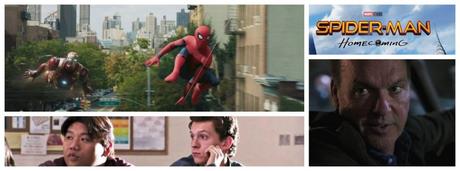
There was a time when no one had any use for Marvel's perceived B-team characters such as Thor and Iron Man. The X-Men and Spider-Man were the characters with brand recognition. In 2002, Sam Raimi brought Spider-Man to the big screen. His Spider-Man 2 was considered one of the greatest superhero films of all time before there were multiple examples of the genre per year. The films serve as early examples that superheroes could yield massive blockbuster success. However, after the critical disaster that was Spider-Man 3 and the underperforming Amazing Spider-Man saga, Marvel's most iconic character was being outperformed by the superheroes once thought of as box-office poison.
Thus it was with no small amount of irony that Marvel Studios had to swoop in and save Spider-Man from Sony's chronic mismanagement. This rescue effort began with Civil War, which introduced us to Tom Holland's endearing, enthusiastic portrayal of Peter Parker; it was further cemented with Spider-Man: Homecomin g. In combination, the two movies accomplished what Sony had long failed at: making Spider-Man fun again.
He's young and likes being a hero but also recognizes that his new abilities make his teenage life far more difficult. Translation: he's a relatable, vulnerable kid beneath that suit. It shouldn't be so hard to get that right. Thankfully, Marvel Studios intuitively understood how to pull that off.
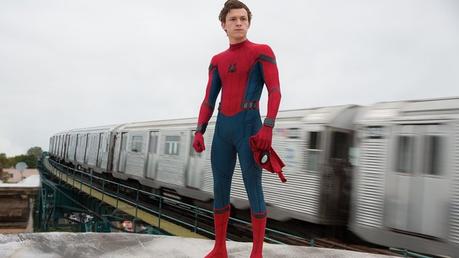
Their first stroke of genius: skip the origin story. In Homecoming, there's no Uncle Ben, no spider bite, no first attempts at leaping through the city. Peter Parker begins the film as Spider-Man, and he's as excited to be part of Iron Man's team as any high school kid would be. The film knows it doesn't need the same exposition that's been portrayed on the screen twice in the twenty-first century. Being freed of having to rehash what we all already know allows Homecoming to just focus on being a strong Spider-Man story.
That's a freedom which director Jon Watts - making the now customary leap from indie ( Cop Car) to blockbuster - embraces enthusiastically. He crafts several thrilling Spider-Man actions sequences, most notably the Staten Island Ferry sequence and the plane-based finale. However, he also finds the time for grounded character interactions - whether it's the father-son rapport between Peter and Tony Stark, the familial warmth of Peter's interactions with Aunt May (Marissa Tomei), or the painfully relatable awkward nerdiness of his relationships with his best friend, Ned (Jacob Batalon) and his crush, Liz (Laura Harrier). They belong in the world of John Hughes as much as they do the world of Marvel.
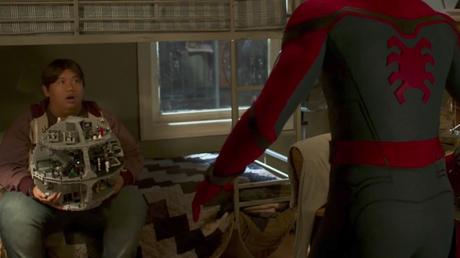
Given that John Hughes comparison, perhaps it's not surprising that Homecoming has charmingly small stakes. The big bad's plot revolves around robberies involving alien tech left over from the Avengers NYC attack. It all culminates, quite simply, in attempted theft of Tony Stark's property. Despite lacking any end-of-the-world ramifications, those smaller stakes actually matter more because truly we care about the characters.
Homecoming never forgets that Spider-Man - and therefore Peter Parker - is a kid, having to learn that he doesn't have to take on every burden by himself, no matter how he feels he must. He, like any teenager, wants to be seen as an adult and can't understand why everyone around him fails to see how ready he is to do everything he wants. His weakness is that he still wants to be both a kid and a superhero, often failing to realize that to succeed at one means sacrificing the other. He can pummel villains but is still bullied by an academic decathlon rival. It's that bizarre contradiction that makes Peter work as a character, and Tom Holland captures that so perfectly. He leans into Peter's geekiness and quippy sense of humor, while always keeping his adolescent vulnerability bubbling beneath Spider-Man's mask.
Beyond that, Homecoming creates something special in its interactions between Holland and Robert Downey Jr. Even if the film never references Uncle Ben, there's an unspoken understanding that Peter would look to Tony as a new surrogate father figure, constantly seeking his attention and approval and feeling slighted when those expectations are unmet. There's a moment when Tony Stark takes Peter to task for his reckless behavior, and Peter laments, "I just wanted to be like you." Like any disappointed parent trying to stop a child from making their mistakes, Tony responds, "And I wanted you to be better."
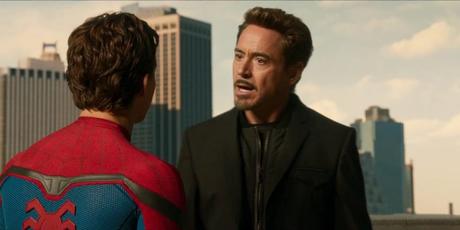
The line stings, because we recognize that Tony isn't prepared to deal with Peter getting himself killed and that Peter feels the disappointment that comes from letting a parent down. That interaction sums up Homecomin g's appeal: it's a film about characters we like and emotions to which we relate.
Homecoming also gives us a Marvel villain that's actually interesting and slightly ambiguous in Adrian Toomes/ Vulture. Granted, this guy shouldn't be that surprised he couldn't just call "dibs" on alien technology in opposition of a government agency, but like Civil War's Zemo, his motivations make sense by simply being personal and not being focused on world destruction or domination. He just wants to provide for his family, and he's willing to resort to illegal means to do so. Casting Michael Keaton beneath the mask does a lot of the character's heavy lifting.
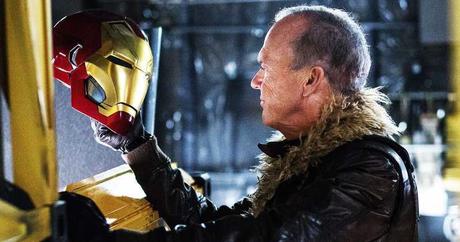
Keaton remains a charming, unpredictable screen presence, the very definition of mercurial. He makes the character more interesting on screen than he probably felt on the page.
When all is said and done, I think Homecoming has my favorite Marvel plot twist: Peter Parker has been forced to give up Spider-Man. He's back to just being a typical high school student. He asks Liz to go to the homecoming dance with him, and Aunt May is there to teach him some adorably dorky dance moves.
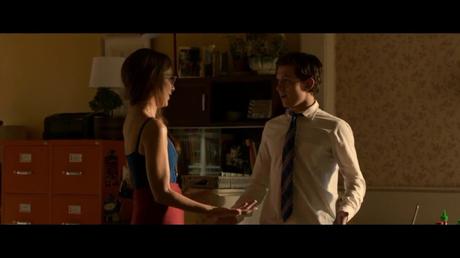
He walks up to Liz's door and knocks. The door opens and both the audience and Peter are struck the horrifying revelation that Liz's father and the Vulture are one and the same. I'm not sure if there's ever been a better "fear of your date's dad" cinematic moment. Perhaps it's a twist I should have predicted, but I didn't and my initial reaction mirrored Peter Parker's: shock and alarm. I remember hearing the theatre collectively gasp, and it's to the film's credit that a twist that we should have worked out remained such a surprise.
Toomes gives Peter the fundamental dilemma at the heart of the Spider-Man narrative: remain a normal teenager and go to homecoming or return to the superhero life and take on the villain, knowing there will be personal fallout. And of course, because Peter is a hero, he makes the sacrifice.
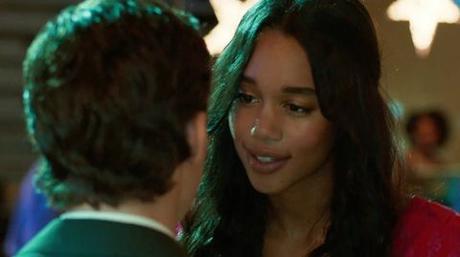
Maybe I'm biased because Spider-Man has always been a favorite superhero of mine, but I completely love Homecoming. I like the characters, I like the way it develops both Peter's real-world life and superhero life, and I like the way those disparate worlds collide at various points. Really, though, I like Homecoming, because it's so much fun. It even gives us a delightfully sarcastic, cynical Mary Jane (Zendaya).
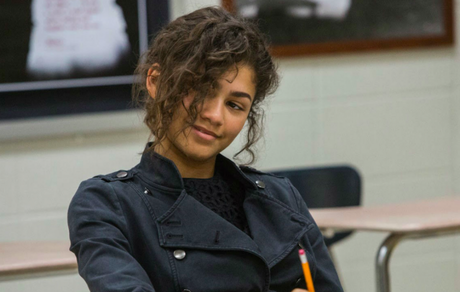
Its jokes and one-liners are actually funny and they're delivered by actors who know how to make the jokes land. Whether it's Tony, pointing out he's not hugging Peter, merely opening his car door, Peter leaving Donald Glover's Ultimate Prowler webbed to a car because he's still a criminal, or Ned asking if Peter can "summon an army of spiders," the film has more jokes that actually work than most films that only attempt to be comedies.
It reminded me why I was so excited to see Spider-Man on screen in 2002: he was the most relatable of superheroes, full of jokes and gleeful exuberance when turned from a bullied teen to someone who can swing from building to building. He's a kid just trying to make his world better, even if he runs the risk of getting himself killed in the process. Now, he's part of the Marvel Cinematic Universe, but he's still just "your friendly neighborhood Spider-Man."

Oh you know, I'm just your typical wallflower, high school theatre nerd who minored in film studies, attained her M.A. in English Literature,works as a substitute teacher, and decided to go to nursing school, but really wants to be a writer who blogs about pop culture, and then have people who. . .wait for it. . .actually read/ look forward to what she writes. In my spare time (when it's there), I watch one of my many blu-rays or DVDs (about 800 now), reading my kindle (one of the greatest inventions ever), playing my ipod (another one of the greatest inventions ever), obsess over b=Broadway musicals and horror films, and play my guitar (badly). In other words, I have no life that doesn't revolve aroung pop culture or school. Sigh. View all posts by Julianne Ramsey

